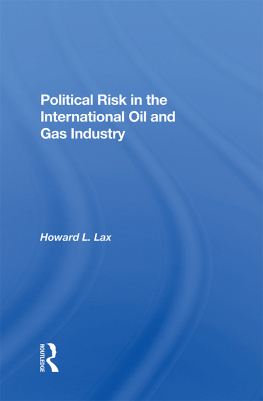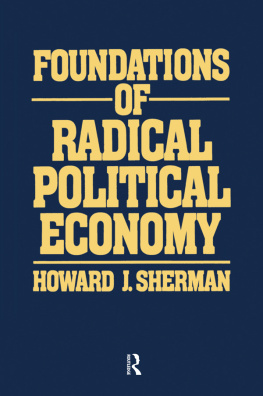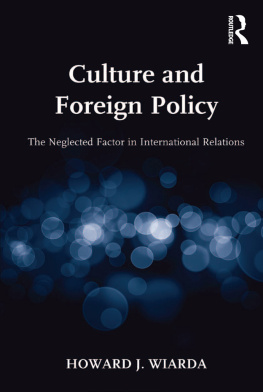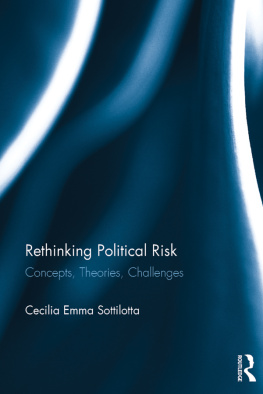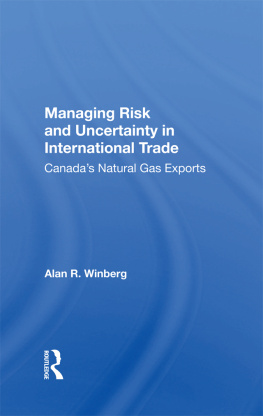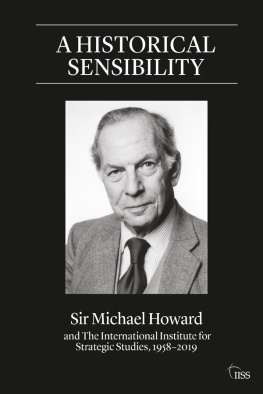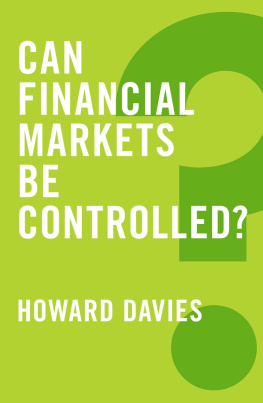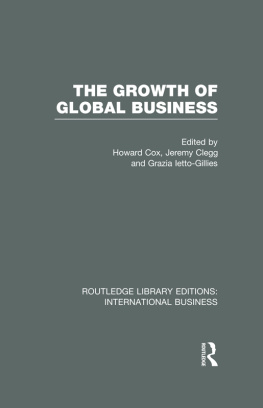Political Risk in the International Oil and Gas Industry
Political Risk in the International Oil and Gas Industry
Howard L. Lax
Atlantis, Inc.
Box 678
Greens Farms, CT
First published 1983 by Westview Press
Published 2019 by Routledge
52 Vanderbilt Avenue, New York, NY 10017
2 Park Square, Milton Park, Abingdon, Oxon OX14 4RN
Routledge is an imprint of the Taylor & Francis Group, an informa business
Copyright 1983 by International Human Resources Development Corporation.
All rights reserved. No part of this book may be reprinted or reproduced or utilised in any form or by any electronic, mechanical, or other means, now known or hereafter invented, including photocopying and recording, or in any information storage or retrieval system, without permission in writing from the publishers.
Notice:
Product or corporate names may be trademarks or registered trademarks, and are used only for identification and explanation without intent to infringe.
Library of Congress Cataloging in Publication Data
Lax, Howard L.
Political risk in the international oil and gas industry.
Bibliography: p.
Includes index.
1. Petroleum industry and tradeUnited States. 2. Gas industryUnited States. 3. Mineral industriesUnited States. 4. Investments, American. 5. International business enterprisesUnited States. 6. Risk.
I. Title.
HD9565.L335 1983 622'.338 '068 82-83329
ISBN 13: 978-0-367-28356-8 (hbk)
For Susan,
without whom there is little
The measurement of political risk has long been a part of commercial decision making in the international petroleum industry. Events in recent years have broadened the audience for such skills, while at the same time called for even more careful assessments by political analysts in the industry. Consequently, it seemed this was the right time for a full-scale study of the contemporary techniques for political risk analysis as they applied to the global oil and gas business.
In this book, Howard Lax has drawn upon his training in political science and experience as an energy consultant at Atlantis, Inc. to focus on these issues. All of us on the staff have enjoyed contributing to this effort, and we would welcome reactions and comments from all readers.
W.G. Prast, Ph.D.
President
Atlantis, Inc.
February, 1983
The separation of economics and politics has been one of the key assumptions in the Western approach to the study of social sciences since the Industrial Revolution. Previously, economics was considered a branch of political philosophy or was ignored. The Greek oikonomikos referred to the management or rule over a household or estate. The mercantilist notion of the Renaissance era posited the acquisition of wealth (which actually meant filling the coffers of the King, the head of the "national household" or state) as an obligation of the state.
The era of contemporary economic thought was spawned by Adam Smithwho held a chair in moral philosophy, not economicswith the publication of The Wealth of Nations in 1776. Although the approach was a study in political economy and Smith acknowledged that politics and economics are inseparable, he and his followers drove a theoretical wedge between politics and economics. By positing "a natural economic order with laws of its own, independent of politics and functioning to the greatest profit of all concerned when political authority interfered least in its automatic operation," questions of economics and politics came to be seen as conceptually discrete.
The doctrines of eighteenth-century laissez-faire capitalism and nineteenth-century liberalism both assumed a separation between the respective domains of economics and politics and advocated a strict distinction as the most sound approach to solving international and domestic economic problems. Carried into the twentieth century, this classical approach viewed politics as an interference that introduced value conflicts and power concerns into the otherwise rigorously rational logic of economics.
The international economy was seen as the national economy writ large. This extrapolation usually was based on the examples of the United States or England. In making the leap from an individual country with a shared set of values and institutional processes to a far more heterogeneous world, theorists continued to assume a commonality based on "sound" economic reasoning. Discounting the political role of states in world affairs, economists spoke (and still speak) in terms of an economic rationality that assumes a harmony of interests that transcends national borders. Ignoring the political motivations implicit in such concepts as the national interest, solutions to economic problems were found in removing political influences from the international economy. It was at this higher plane of human affairs that economic questions were to be isolated from the unwarranted influence of international politics.
Although this idealistic approach has been modified greatly during the course of the century, the pragmatic capitalism that emerged in the post-World War II era still played down nonmarket influences in analyzing and formulating economics and business policies. Domestically, investment decisions were to be dictated by the anticipated rates of return from alternative business opportunities. Similar logic was applied to questions of foreign investment: investments should be made abroad when the expected foreign rate of return exceeded that offered on domestic investments.
In the "ideal" free market economy, companies no doubt would prefer conditions under which their operations were totally removed from political concerns. Increasingly, however, firms have come to realize that political variables constantly impinge upon economic issues that affect the company's operating environment. More immediate to a company's interests, political events and decisions often have a direct impact on even the most routine operations. Particularly in the international setting, the failure to treat economics as a field thoroughly interrelated with politics is a serious shortcoming in most modern economic thought.
In addition to traditional economic or business risks, corporate decision makers have begun to recognize a new category of risks that is political in nature. Foreign government interference in corporate operations was the exception rather than the rule throughout the 1950s and most of the 1960s. By the late 1960s, changing political conditions began to have a greater impact on the interests of firms with investments abroad, and the pattern of politically motivated changes in foreign operations became the norm during the 1970s. In the past five years, more than 60 percent of the U.S. firms operating abroad reported being subject to "politically inflicted damage."
Although the domestic political environment affects company affairs, most of the focus on political risks deals with investment abroad. Companies tend to be more familiar and comfortable with the domestic environment. Executives understand the political processes at home, know how to influence political outcomes, and see the future as predictably stable. Foreign political conditions, on the other hand, are less well understood and therefore are seen as inherently more risky and less predictable.
Because each country constitutes a distinct business environment and political risks are usually identified with foreign investments, transnational corporations (TNCs)frrms that operate in a number of countriesare particularly concerned with the impact of political changes on corporate interests. Confronted with a multitude of operating environments, TNCs must cope with a variety of "political and economic systems, each with its attendant controls and risks, advantages and disadvantages, opportunities and dangers." Because each state has its own interests, traditions, and institutional processes, TNCs are subjected to a broad range of operating environments under a seemingly endless variety of conditions. The result is a proliferation of both traditional and political risks.


